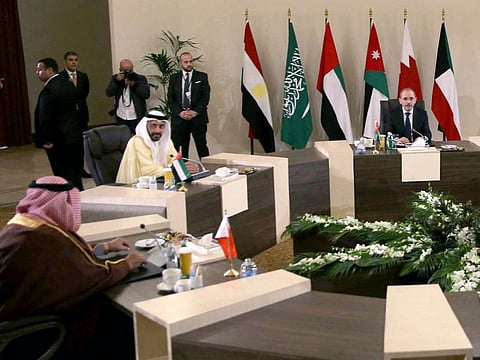Arab leaders must adopt a common position
In the Dead Sea talks the bigger challenge is to find ways to reinvigorate Arab Order

For years, this region has been stuck in a rut; caught in one crisis after another. Arab countries are divided over a series of regional crises, whether it is Syria, Iraq, Yemen, Iran or even what used to be a common and uniting cause — Palestine.
Over and above are the pressing economic, social and environmental challenges, among others, that threaten to destabilise this region even further. Inter-Arab differences have weakened the Arab League mechanism. That organisation has been crippled for years and its meetings and resolutions rarely get noticed by the public.
This is perhaps the main objective of an extraordinary meeting of six-nation Arab foreign ministers hosted by Jordan on Thursday. Jordanian sources said that consultations took place over major regional files with the aim of coordinating positions. The foreign ministers of the UAE, Kuwait, Bahrain, Saudi Arabia, Egypt and Jordan met in the Dead Sea to discuss current regional challenges and ways to handle them.
The meeting came at a crucial time for the region and a few weeks before Arab leaders convene their annual Arab summit, which will be held in the Tunisian capital in March.
Chief among the issues discussed at the Dead Sea is restoring Syria’s membership in the Arab League, which was frozen in 2011 in the wake of the Syrian uprising. Relations between Damascus and Arab countries have witnessed a thaw lately, with the UAE and Bahrain reopening their embassies in the Syrian capital, Jordan reopening its borders with Syria and resumption of visits between Syrian and Arab officials at various levels.
It is a difficult decision to make since some Arab countries, such as Qatar, are resisting pressure to normalise ties with the Syrian government. The Lebanese government is divided over the matter as well. One major objective for readmitting Syria would be to distance the regime from Iran and attempt to redraw the geopolitical map after a tumultuous seven-year period, during which, both Iran and its proxies have entrenched themselves in that country.
Similarly, both Russia and Turkey now have strategic interests in Syria while the United States is making plans to withdraw. With the Syrian crisis entering a penultimate phase, Arab countries cannot afford to follow the policies of the past few years.
Along the same lines, normalising ties with Iraq is of utmost importance. These ties have improved recently as Gulf countries reopened embassies and received senior Iraqi officials. Earlier this month, Jordan’s King Abdullah paid an official visit to Baghdad, one that was described as historic by Iraq’s Prime Minister Adel Abdul Mahdi.
For Jordan, which borders Iraq and Syria, the stability of both countries falls directly into its own national security.
When both countries were engulfed in chaos, Daesh and other extremist groups appeared posing an unprecedented regional and global threat. That threat remains even as the terrorist organisation is largely defeated.
Meddling in region’s affairs
The situation in Iraq and Syria is directly linked to another major regional challenge; that of Iran. The six foreign ministers meeting in Jordan had to coordinate positions with regard to Iran’s continued meddling in the region’s affairs. The meeting came two weeks before a planned global conference called by the US in Warsaw whose aim appears to be building an anti-Iran coalition, although US officials have now denied that.
Objecting to Iran’s nefarious agenda in the region is one thing, but being pushed into a coalition that might be used to wage war is another. Certainly the region cannot afford another military showdown. The Jordan meeting likely discussed adopting a common position on the purported US Middle East peace plan, which the US ambassador in Israel recently said will be unveiled following the Israeli general elections in April. Much has been said about this plan in the wake of controversial steps that the US had taken last year that included recognising occupied Jerusalem as Israel’s capital and stopping aid to UNRWA and the Palestinian National Authority (PNA).
The Palestinian issue remains a central cause for most Arabs. But with the two-state solution now in peril, a hawkish Israeli government is inching closer to forcing a unilateral solution that denies Palestinians the right to self-determination and statehood. How the Arab countries will react to US President Donald Trump’s peace plan remains unknown.
The biggest challenge for the six Arab foreign ministers was to find ways to reinvigorate the Arab Order at a time when regional challenges are looming large. This is a monumental task, which, as much as it is needed at this stage, remains unfulfilled.
Osama Al Sharif is a journalist and political commentator based in Amman.


